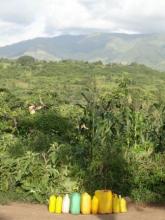Document
Poor people in developing countries need water for many purposes: for drinking, bathing, irrigating vegetable gardens, and watering livestock. However, responsibility for water services is divided between different government agencies, the WASH (Water, Sanitation and Hygiene) and irrigation sub-sectors, with the result that people's holistic needs are not met. Multiple use water services (MUS) is a participatory water services approach that takes account of poor people's multiple water needs as a starting point of planning, and the approach has been implemented in at least 22 countries in Africa, Asia and Latin America. Scaling up Multiple Use Water Services argues that by designing cost-effective multi-purpose infrastructure MUS can have a positive impact on people's health and livelihoods. It analyses and explains the success factors of MUS, using a framework of accountability for public service delivery, and it also examines why there has been resistance against scaling up MUS. A stronger service delivery approach can overcome this resistance, by rewarding more livelihood outcomes, by fostering discretionary decision-making power of local-level staff and by allowing horizontal coordination.This book should be read by government and aid agency policy makers in the WASH and agriculture sectors, by development field workers, and by academics, researchers and students of international development.
There is growing evidence that rural and peri-urban households depend on water not only for basic domestic needs but also for a wide variety of livelihood activities. In recognition of this reality, an alternative approach to water service planning, known as multiple-use water services (MUS), has emerged to design water services around householdsʼ multiple water needs. The benefits of MUS are diverse and include improved health, food security, income generation, and women’s empowerment. A common argument put forth by WASH sector professionals in favour of upgrading existing water systems is that productive water uses allow for income generation that, in turn, enhances the ability to pay for services. However, there has been limited rigorous research to assess whether the additional income generated from productive use activities justifies water service upgrading costs. This paper describes an income-cost (I-C) analysis based on survey data and EPANET models for 47 domestic-plus water systems in rural Senegal to assess whether the theoretical financial benefits to households from additional piped-water-based productive activities would be greater than the estimated system upgrade costs. The paper provides a transparent methodology for performing an I-C analysis. We find that the potential incremental income earned by upgrading the existing domestic-plus systems to provide intermediate-level MUS would be equivalent to the funds needed to recover the system upgrade costs in just over one year. Thus, hypothetically, water could pay for water. A sensitivity analysis shows that even with a 55% reduction in household income earned per cubic meter of water, the incremental income is still greater than the upgrade costs over a ten-year period for the majority of the systems.
The Millennium Water Alliance Ethiopia Programme (MWA-EP) has experimented with the Multiple Use water Services (MUS) approach to improve water and food security.
With support from the RAIN initiative, Water Action and Millennium Water Alliance, with technical support from Catholic Relief Services (CRS) Ethiopia, extended projects to supply water for productive as well as domestic uses in Kalu woreda. This case study examines how the Multiple Use water Services (MUS) approach was applied in Kalu to develop joint domestic water supply and irrigation schemes.
With support from the RAIN initiative and Millennium Water Alliance, the Ethiopian Evangelical Church Mekane Yesus (EECMY) and WaterAid Ethiopia have been working with governments and communities to enhance traditional water supply interventions. The objective was to increase both water and food security. This case study examines how a productive element was added to community water supply.


